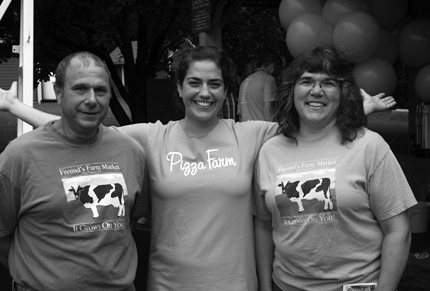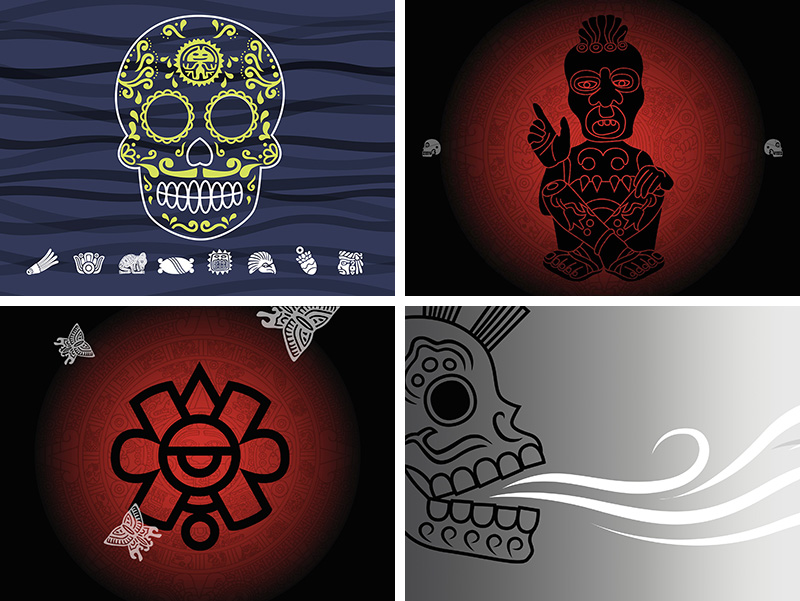
September 2, 2009
Pizza Farm

Project M’s Laura Grey with farmers at Pizza Farm
Founded six years ago by the graphic designer John Bielenberg, Project M invites young designers to engage in social activism. The multi-week program has brought attention to Costa Rica’s fragile environment, computer equipment to New Orleans after Hurricane Katrina and access to the municipal water system for residents of impoverished Hale County, Alabama.
On August 15, Project M at Winterhouse, hosted by Design Observer’s co-founders William Drenttel and Jessica Helfand, convened in Falls Village, Connecticut, to explore the concerns of an economically stratified rural New England county. Nine participants, from worlds as diverse as advertising, engineering, fine art and web design, were struck by an apparent divide in local attitudes toward food: Although the region supports dozens of small farms producing high-quality meats, cheeses and produce — such businesses as Rustling Wind Creamery in Falls Village, and Meili Farm, a producer of pork, beef, eggs and honey in Amenia, New York — they are unknown to a large portion of the community. As Project M member Marshall Rake, a recent Art Center College of Design graduate, explained, “We found lots of restaurants that don’t have a connection to the farmers and are using boxed ingredients. Our idea was to show them what was available.”
To call attention to this bounty, Project M organized Pizza Farm: grilled pizzas made from local ingredients and distributed for free on a Saturday afternoon in a park in downtown Canaan, Connecticut.
Once the group had refined its plan, they had less than a week to implement it. The final days saw Project M members scouting for locations, acquiring party-hosting and food-serving permits, sourcing ingredients, renting food-preparation equipment, posting fliers, granting interviews to local media outlets and producing T-shirts, posters, balloons and cards with information about the farms (including recipes). Funding came from the participants’ $1,500 program fee, which also covered living expenses. The group conceived and carried out the initiative with guidance from members of local community foundations and from visiting design critics Michael Bierut, Alice Twemlow, Allan Chochinov, Michael Vanderbyl and Marc Alt.
Pizza Farm’s grilled pizzas
At 4 p.m. on August 29, Pizza Farm opened with crowds picking up readymade pizza shells that had been supplied by a local bakery and slathered with fresh tomato sauce. The diners filed along a buffet table from which they selected a choice of kale, homemade sausage, basil, mozzarella, squash, corn, broccoli, beets, chard, garlic and peaches. The customized pies were grilled and served with fresh lemonade. Three hundred pizzas were prepared in the event’s two hours.
Pizza Farm isn’t the first Project M initiative centered on food. Last year, participants distributed homemade dessert pies in Hale County, Alabama, a project that has evolved into Pie Lab, a business funded by a $100,000 enterprise grant and operated by community members. “Young people are really trying to figure out the food thing,” observes Bielenberg. Adds Drenttel: “Food is the new revolution. It cuts across economic lines, supports individual health and the environment, and is centered around ideas of community. It’s the local economy at its best, at its most sustainable.”
Observed
View all
Observed
By Julie Lasky
Recent Posts
Mine the $3.1T gap: Workplace gender equity is a growth imperative in an era of uncertainty A new alphabet for a shared lived experience Love Letter to a Garden and 20 years of Design Matters with Debbie Millman ‘The conscience of this country’: How filmmakers are documenting resistance in the age of censorship
 Julie Lasky is editor of Change Observer. She was previously editor-in-chief of
Julie Lasky is editor of Change Observer. She was previously editor-in-chief of 

